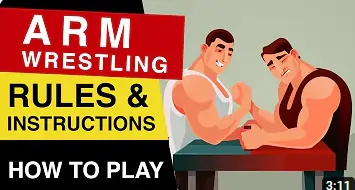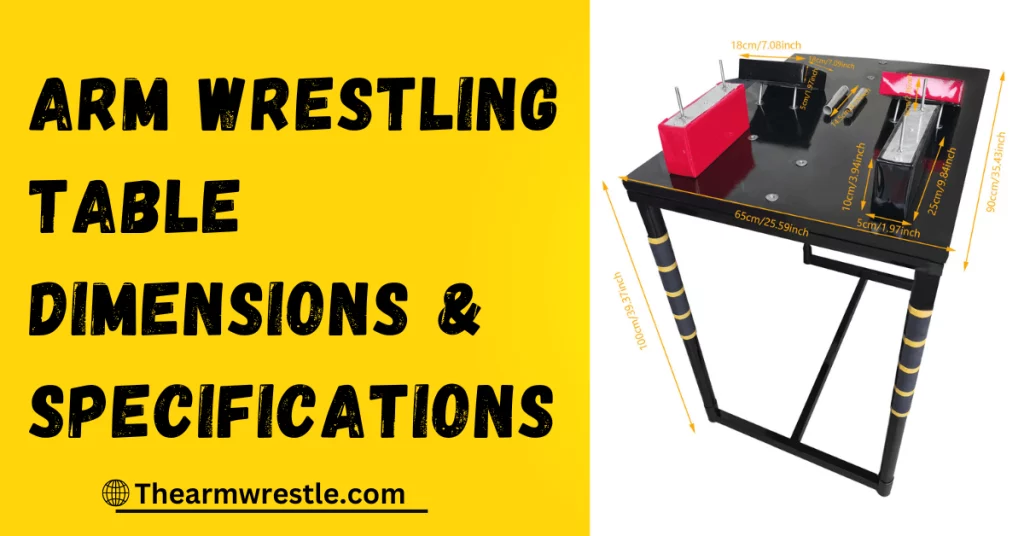Arm wrestling is a thrilling sport that combines strength, technique, and strategy. To excel in this exciting competition, it’s crucial to not only build your physical strength but also understand and master the rules that govern it. In this comprehensive guide, we will delve into the world of arm wrestling rules, from the basics to the finer details that can make all the difference in your performance.
Teams in Arm Wrestling Rules
In Arm wrestling each team participating in the competition must consist solely of members who hold the nationality of the country they represent. If deemed necessary, individuals or team members may be requested to provide appropriate documentation to the World Armwrestling Federation (WAF) to verify their nationality and eligibility to represent their country. The term “team” encompasses all competition categories, including left and right arm divisions, for both male and female participants. A team trophy will be conferred based on the cumulative points earned by a country’s representatives across all categories and genders.
Number in a Team
Up to two competitors per Country in each right and left arm categories. This includes Senior, Masters, Grand Masters, Disabled and Youth Divisions.
Arm Wrestling Rules (Weight Classes)
SENIOR RIGHT & LEFT ARM
| MEN | WOMEN |
|---|---|
| -55 kg | -50 kg |
| 60 kg | 55 kg |
| 65 kg | 60 kg |
| 70 kg | 65 kg |
| 75 kg | 70 kg |
| 80 kg | 80 kg |
| 85 kg | 90 kg |
| 90 kg | +90 kg |
| 100 kg | … |
| 110 kg | … |
| +110 kg | … |
Women’s : 0-50kg, 55kg, 60kg, 65kg, 70kg, 80kg, +80 kg.
MASTER RIGHT & LEFT ARM (40-49 years old)
| MEN | WOMEN |
|---|---|
| -60 kg | -60 kg |
| 70 kg | 70 kg |
| 80 kg | 80 kg |
| 90 kg | +80 kg |
| 100 kg | |
| +100 kg |
Women : -60 kg, 70 kg, 80 kg, +80 kg.
GRAND MASTER RIGHT & LEFT ARM (50-59 years old)
| MEN | WOMEN |
|---|---|
| -70 kg | -60 kg |
| 80 kg | 70 kg |
| 90 kg | 80 kg |
| 100 kg | +80 kg |
| +100 kg |
Women : -60 kg, 70 kg, 80 kg, +80 kg.
SENIOR GRAND MASTER RIGHT & LEFT ARM (60-69 years old
| MEN | -70 kg | 80 kg | 90 kg | 100 kg | +100 kg |
SENIOR SUPER GRAND MASTER RIGHT & LEFT ARM (70 years old and over)
Men : Open
SUB-JUNIOR 15 YEARS RIGHT & LEFT ARM (14-15 years old)
| BOYS | GIRLS |
|---|---|
| -45 kg | 40 kg |
| 50 kg | 45 kg |
| 55 kg | 50 kg |
| 60 kg | 55 kg |
| 65 kg | 65 kg |
| 70 kg | 70 kg |
| 70+ kg | 70+ kg |
Girls : -40 kg, 45 kg, 50 kg, 55 kg, 60 kg, 70 kg, 70+ kg
JUNIOR 18 YEARS RIGHT & LEFT ARM (16-18 years old)
| BOYS | GIRLS |
|---|---|
| 50 kg | -45 kg |
| 55 kg | 50 kg |
| 60 kg | 55 kg |
| 65 kg | 60 kg |
| 70 kg | 65 kg |
| 75 kg | 70 kg |
| 80 kg | 70+ kg |
| 90 kg | |
| 90+ kg |
Girls : -45 kg, 50 kg, 55 kg, 60 kg, 65 kg, 70 kg, +70 kg
YOUTH 23 YEARS RIGHT & LEFT ARM (19-23 years old)
| MEN | WOMEN |
|---|---|
| -55 kg | -50 kg |
| 60 kg | 55 kg |
| 65 kg | 60 kg |
| 70 kg | 65 kg |
| 75 kg | 70 kg |
| 80 kg | 70+ kg |
| 85 kg | |
| 90 kg | |
| 90+ kg |
Women : -50 kg, 55 kg, 60 kg, 65 kg, 70 kg, +70 kg
PARA-Arm Wrestling Rules
Physical Impairment athletes (PID) sit-down table
| MEN | WOMEN |
|---|---|
| 55 kg | –55 kg |
| 65 kg | 65 kg |
| 75 kg | 65+ kg |
| 100 kg | |
| 100+ kg |
Women : -55 kg, 65 kg, +65 kg
Physical Impairment athletes (PIU) stand-up table
| MEN | WOMEN | BOYS | GIRLS |
|---|---|---|---|
| -60 kg | -55 kg | -55 kg | -50 kg |
| 70 kg | 65 kg | 65 kg | +50 kg |
| 80 kg | 65+ kg | 65+ kg | |
| 90 kg | |||
| 90+ kg |
Junior 23 years : Boys : -55 kg, 65 kg, +65 kg : Girls : -50kg, +55
Physical Impairment athletes with upper limbs impairment (PIDH) sit-down table
Men : -80 kg, +80 kg
Physical Impairment athletes with upper limbs impairment (PIUH) stand-up table
| MEN | WOMEN | BOYS |
|---|---|---|
| -85 kg | -65 kg | -60 kg |
| +85 kg | +65 kg | +60 kg |
Visual impairment athletes (VI) stand-up table
| MEN | WOMEN | BOYS | GIRLS |
|---|---|---|---|
| -60 kg | -60 kg | -55 kg | 50 kg |
| 70 kg | 70 kg | 65 kg | 50+ kg |
| 80 kg | 70+ kg | 65+ kg | |
| 90 kg | |||
| 100 kg | |||
| 100+ kg |
Women : -60 kg, 70 kg, +70 kg
Boys : -55 kg, 65 kg, +65 kg
Girls : 50 kg, +50 kg
Hearing impairment athletes (HI) stand-up table
| MEN | WOMEN | BOYS | GIRLS |
|---|---|---|---|
| -60 kg | -60 kg | -55 kg | 50 kg |
| 70 kg | 70 kg | 65 kg | 50+ kg |
| 80 kg | 70+ kg | 65+ kg | |
| 90 kg | |||
| 100 kg | |||
| 100+ kg |
Women : -60 kg, 70 kg, +70 kg
Boys : -55 kg, 65 kg, +65 kg
Girls : 50 kg, +50 kg
Cerebral Palsy impairment athletes (CPD) sit-down table
Men : -55 kg, 65 kg, +65 kg
Cerebral Palsy impairment athletes (CPU) stand-up table
Men : 60 kg, 70 kg, 80 kg, +80 kg
Arm Wrestling Rules (Weigh-ins)
There is no clothing allowance, therefore weigh-ins will be done in the nude if an athlete wishes to qualify for a certain weight class. (Weight has to register to zero, i.e.: if 70kg class it will have to zero to 70.0kg). Without prejudice or bias, if an athlete has artificial limbs or limb, they must weigh in with them on if they wish to compete with them on.
There will be no dispute regarding procedure during weigh-ins. Weigh-ins will follow registration roster
by numerical order, i.e.: first team to register with WAF General Secretary, will be the first team
weighed and so on. The WAF will have the right to disallow entry to any country not meeting WAF
requirements or which creates disorder.
All weigh-ins to be done on WAF approved scales. Weigh-in will be done no sooner that 24 to 30 hours
before the first day of competition start time. All participating referees are allowed to weigh-in with the
Juniors & Masters before the 1st day of competition.
- During weigh-in, an athlete may be accompanied by a team official of their own country.
- More than one official weigh-in scale may be used.
- The Director of weigh-ins is the final authority on all weigh-in procedures.
- A competitor may weigh-in to their normal weight or jump one weight class higher.
Multiple entries registration rules:
- Sub-Juniors 15 cannot register in any other class.
- Junior 18 cannot register in Youth 23 classes.
- Juniors 18 & Youth 23 years can register in Seniors classes.
- Masters, Grand Masters, Senior Grand Master or Super Seniors Grand Masters can register only on their age group.
- Masters, Grand Masters, Senior Grand Masters and Super Senior Grand Masters can register in Seniors classes.
- Para-athletes cannot register in able athlete’s classes.
Arm Wrestling Rules (Age Groups)
Please note: Age will be determined by calendar year.
| Sub Junior | – 14, 15 years old |
| Junior 18 | – 16 to 18 years old |
| Youth 23 | – 19 to 23 years old |
| Senior | – any age |
| Masters | 40 to 49 years old |
| Grand Master | 50 to 59 years old |
| Senior Grand Master | 60 to 69 years old |
| Super Senior Grand Master | 70 and above |
- If so required by WAF, proof of age will have to be given by producing a bona fide passport or medical certificate
- If so required by WAF, proof of gender may be required under qualified medical supervision by WAF appointed physicians
- If so require by WAF, proof of disability will have to give by producing a bona fide disability card or medical certificate.
Team Points
Team classification will be made based on the number of Gold, Silver and bronze medals. In case that two teams have the same number of gold, silver and bronze medals the position of the two will be determined by the following pointing system:
| POSITION’S | POINT’S |
|---|---|
| 1st Position | 10 Points |
| 2nd Position | 7 Points |
| 3rd Position | 5 Points |
| 4th Position | 4 Points |
| 5th Position | 3 Points |
| 6th Position | 2 Points |
| 7th Position | 1 Points |
- WAF Minor officials are responsible for team point tabulation and break down of rankings in all categories.
- Team points will be counted individually for Senior Classes, Master Classes (Master, Grand Master &Senior Grand Master), Junior Classes (Junior 18 & Youth 23) and Disabled Classes.
Conclusion
In conclusion, the technical rules of arm wrestling are the cornerstone of this physically demanding sport. They ensure a level playing field, safety, and the integrity of every match. Embracing these rules not only fosters fairness but also elevates the experience for all participants, whether they are veterans or newcomers to the sport. In essence, these rules are not just guidelines; they are the essence of arm wrestling, uniting competitors in the spirit of sportsmanship and competition.
1. How can I become proficient in arm wrestling rules?
To become proficient, study the rules of the specific event you plan to participate in, practice with experienced arm wrestlers, and attend tournaments to gain practical experience.
2. What are the basic arm wrestling rules?
The basic rules include starting with the elbows on the pads, waiting for the referee’s “Go” signal, and attempting to pin your opponent’s hand to the table within the defined boundary.
3. What is the “Go” signal, and why is it important?
The “Go” signal is given by the referee to start the match. It ensures a fair start and prevents participants from moving before the match begins.
4. What is the role of the referee in arm wrestling?
Referees start the match with the “Go” signal, monitor for fouls, and determine the winner of each round. They play a critical role in ensuring fair play.



